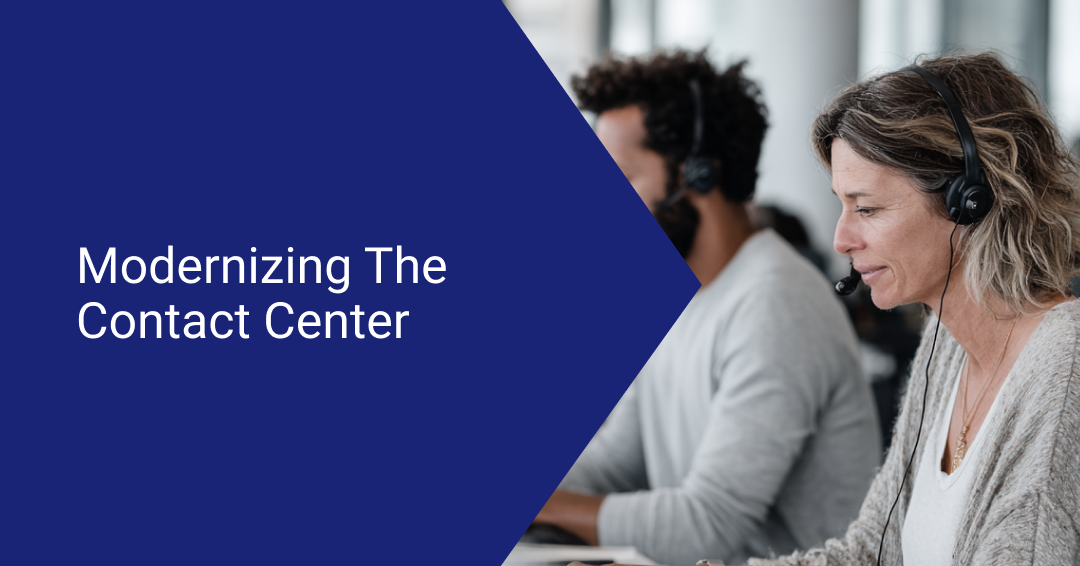Modernizing Your Contact Center for Better CX and ROI
What does great customer service look like? It’s delivering timely solutions that leave customers satisfied.

HR operations are historically complex. Business leaders turn to HR managers to navigate organizational complexities with the least impact on employees, stakeholders, and the business. Cutting-edge technologies play an important role in efficient human resource strategies. AI-based solutions streamline human resources processes and enable HR automation.
The use of AI in HR continues to grow as HR automation helps mitigate employee burnout and save companies money. In fact, 25% of companies use AI, specifically “intelligent automation,” to support HR operations. AI-enabled intelligent virtual agents (IVAs) facilitate HR automation and can learn from past interactions to improve employee experiences. AI in HR relieves HR teams of repetitive, time-consuming tasks so employees can focus on more complex internal responsibilities.
HR automation can benefit organizations in several ways, such as increasing productivity and cost savings. Modern human resource strategies include AI and intuitive solutions that streamline human resources processes and enable HR automation.
Companies that use AI to automate common HR operations can improve employee experiences, an especially relevant objective in today’s competitive job market. Business leaders are mindful of ways to reduce the burden on employees to reduce burnout and turnover. HR automation is an effective way for business leaders to retain talent because it supplements workloads. For example, AI in HR can minimize errors, streamline reporting, predict next steps, and inform decision-making. These capabilities save employees time and reduce the burden on them to manually track data. AI in HR also helps the company save money and improve human resource strategies around employee retention.
IVAs enable intelligent automation and enhance a variety of HR operations. Below are four use cases of AI in HR.
Recruitment is a top focus of a corporate human resource strategy. HR teams can use AI to simplify the search for candidates. For example, intelligent tools can sift through and filter job applications and identify profiles that meet position selection criteria. One way AI-enabled solutions auto-screen candidates in this way is through machine learning.
AI in HR can also perform sentiment analysis on job descriptions to identify any potentially biased language. Removing biased language is especially important for organizations focused on diversity, equity, and inclusion.
HR automation in recruitment plays a vital role for companies that want to remove time-consuming responsibilities from employees and drive recruitment initiatives. As HR teams leverage AI to streamline operations, they will positively impact the organization’s bottom line.
AI in HR operations makes it easy for employees and employers to catch and flag any payroll discrepancy. Payroll is one of the most significant business expenses. Employee wages equate to an average of more than 60% of total business costs. Despite its vital role, payroll can be quite complex due to tax codes, bonuses, and other factors.
Fortunately, payroll is well suited for automation. Businesses can leverage AI in HR to ensure payroll accuracy. HR automation in payroll monitors how the system collects and processes employee data to improve efficiency. If employees notice a payroll discrepancy, they can report it to an IVA. They can also interact with the IVA to update any personal information that might have caused the issue.
HR automation’s ability to mitigate payroll discrepancy positively impacts a company’s bottom line through time savings and accuracy.
HR automation also reduces the need for managers to handle employee scheduling. Companies can automate their PTO request process so employees don’t have to check in directly with an HR representative. For example, employees can text an IVA or send schedule requests directly into a system that checks the dates against other approved PTO. Employees receive notifications about their requests in real-time. More specifically, the IVA lets the employee know the probability of PTO approval. At the same time, managers can focus on more complex responsibilities, and employees aren’t left waiting for answers.
Employees can also use IVAs to schedule or report a shift change to management, which is vital in today’s economy. Businesses constantly navigate new workforce demands. The pandemic made employee scheduling and sick time requests more complicated for organizations. If an employee is sick or needs to manage a shift change, they can use an IVA to automatically determine and secure shift coverage. HR teams can then use data from the IVA to automatically communicate the shift change to other employees.
Mosaicx is an IVA that helps businesses meet evolving customer and employee demands and generate revenue. We help business leaders and HR teams build human resources strategies that effectively meet their needs. Our customers use Mosaicx to achieve HR automation and enable self-reporting capabilities for their employees and HR teams. The way we use conversational AI in HR also streamlines and personalizes processes to improve employee experiences.
A modern human resource strategy relies on the latest technologies. AI in HR continues to grow as an effective strategy as customer and employee needs evolve. Companies that invest in intelligent automation solutions can streamline and enhance HR operations. As they do, they will improve employee experience and ROI with IVAs that enable HR automation.

What does great customer service look like? It’s delivering timely solutions that leave customers satisfied.

Every conversation with a customer leaves clues about what they actually want. They don’t always have to say it out loud that a certain feature needs...

Your business interacts with customers across multiple channels. However, if these interactions are not connected, they prevent consistent service...